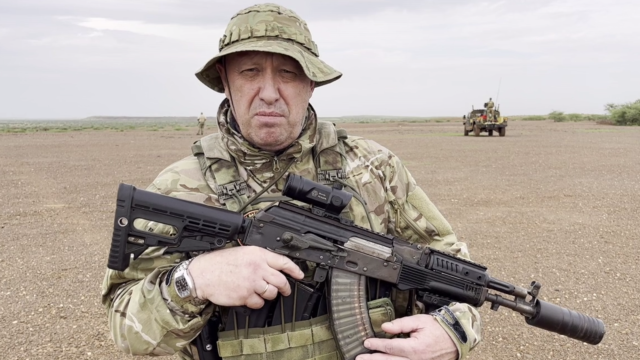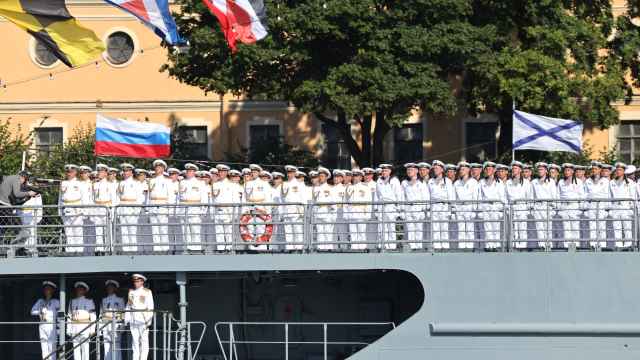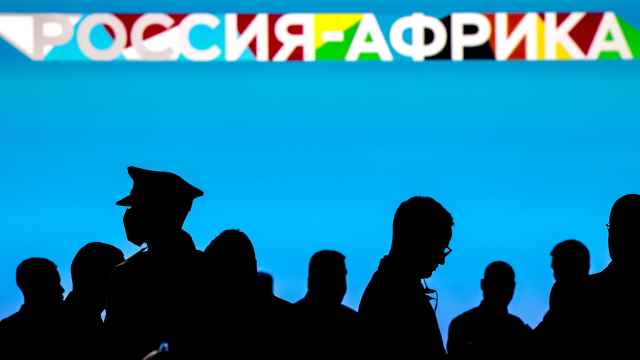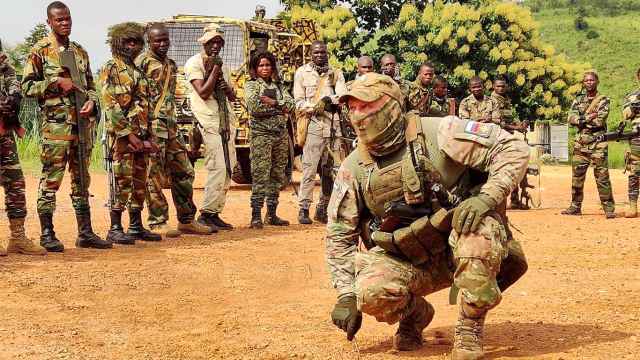Alpha Conde of Guinea had a favor to ask Vladimir Putin when the two presidents met at the inaugural Russia-Africa summit in the Black Sea resort of Sochi in October.
“I would like, if possible, to spend most of our meeting in a one-in-one format because I have things to say to you that are not worth discussing in such a large group,” the 81-year-old West African leader said.
“My pleasure,” Putin, 67, replied as aides began to herd the several dozen officials and reporters in attendance out of the room, leaving him and Conde alone with their respective translators.
While neither side has revealed exactly what was said, Conde has made no secret of his interest in finding a way to stay in power after his second — and legally last — term ends next October. This week, he unveiled a proposed new constitution that could allow him to extend his rule. Both the U.S. and France, Guinea’s former colonial ruler, are urging Conde to avoid risking civil unrest by changing the landmark constitution that allowed the former academic and long-time opposition leader to become the country’s first democratically elected head of state in 2010.
Russia, on the other hand, is throwing its weight behind Conde’s undeclared campaign. That makes Guinea, holder of the world’s largest deposits of bauxite, a key raw material for making aluminum, the latest focus in a renewed tug-of-war among global powers for influence and profit across resource-rich Africa.
The U.S., western Europe and China have advantages over Russia in other areas of the continent. But in Guinea, the Kremlin is leveraging a mix of old Soviet ties, new capitalist might in the form of aluminum giant United Co. Rusal and Putin’s popularity among other leaders.
Putin is widely viewed as a kind of “guru” in Africa, Viktor Boyarkin, a former diplomat and ex-Rusal security chief who’s known Conde for a decade, said in an interview in Moscow. “People come to him for advice.”
Initially hailed when he came to power for ushering in democratic rule, Conde has cracked down in recent years as opposition has grown. In August, the International Monetary Fund called the poor, mainly Muslim nation of 13 million “a fragile country with heightened risks of social and political instability.”
The same day Putin discussed possible constitutional changes in Moscow, fueling speculation that he was seeking ways to remain in power beyond the end of his term in 2024, Conde unveiled plans for a new version of Guinea’s basic law that would lengthen the presidential term. He said the new document would need to be approved in a national referendum.
“A new constitution would allow him to seek a third mandate if he wishes,” said Aboubacar Sylla, a government spokesman. “The president has never spoken about a third mandate and before a referendum can be held it’s not even an issue.”
But opponents said the plan is proof their fears that Conde plans to stay in power are justified. “This confirms his intentions,” Sidya Toure, the president of opposition group Union of Republican Forces and a former prime minister, told Guineenews.
Back in January, Putin’s envoy to Guinea had stunned local opposition groups and foreign governments alike by backing constitutional changes to extend Conde’s rule. In a speech broadcast on state television, then-Ambassador Alexander Bregadze called Conde “legendary” and argued that constitutions shouldn’t be considered immutable works akin to “The Bible or Koran.”
Four months later, Rusal hired the ambassador as its country chief in Guinea. Rusal, which was run by billionaire Oleg Deripaska until U.S. sanctions imposed over his ties to Putin forced him to step down in 2018, sources about 40% of its bauxite from Guinean mines.
Russian advice
Boyarkin is consulting Conde’s administration ahead of the possible extension to his rule, according to three people with direct knowledge of the efforts. Boyarkin denied being an “adviser” to Conde. That may have something to do with being blacklisted by the U.S. a year ago over his ties to Deripaska, which prompted him to give up ownership of Bureau Legint, a Russian consultancy working in Guinea.
Boyarkin said his only activity in Guinea now is offering advice and his “high-level” contacts to foreign companies pursuing investment opportunities, including hydroelectric and mining projects. Sylla, the government spokesman, declined to comment on any connections to Conde.
Kremlin spokesman Dmitry Peskov said Russia isn’t involved in anything to do with Guinea’s “internal affairs.”
Still, Russia’s embrace of Conde has put it at odds with the U.S. and France, both of which have mounted public and private diplomatic campaigns to get him to step down at the end of his term.
In August, during a tense exchange in southern France, French President Emmanuel Macron told Conde he was concerned about the tensions that a possible third term could cause in Guinea and warned he’d be watching closely, according to two people familiar with the conversation. Conde replied tersely that he’ll rely on his own counsel, the people said. Sylla, the Guinean government spokesman, said Conde hasn’t discussed the possibility of a third term either with Macron or Putin. A spokeswoman for the French president didn’t respond to requests for comment on the meeting.
U.S. pressure
France has also been working with countries bordering Guinea to “safeguard the spirit” of the Guinean constitution and ensure the next elections are “free, peaceful and transparent,” French Foreign Minister Jean-Yves Le Drian said earlier this year.
U.S. Secretary of State Michael Pompeo delivered a similar message during Conde’s trip to Washington in September, stressing the importance of “regular, democratic transitions of power,” according to the State Department.
A few weeks later, just before Conde met with Putin, mass demonstrations against changing Guinea’s constitution erupted in Conakry. At least 14 protesters and one policeman have been killed in clashes since, according to Human Rights Watch.
Opposition leaders say Guineans are growing increasingly suspicious of Russia’s role because it’s starting to look like the Kremlin is blatantly interfering in their politics.
“We originally thought Bregadze’s comment on the constitution was the personal position of an ambassador close to Conde,” said Cellou Dalein Diallo, who lost the 2015 presidential election but refused to recognize the results over what he called massive vote-rigging. “But now we don’t know because Russia hasn’t denied this position.”
Boyarkin blames the protests mainly on “outside forces” and has nothing but praise for Conde. “I consider him a savior for Guinea.”
Manafort ties
Boyarkin also has influential ties elsewhere. The U.S. Treasury, imposing sanctions on him a year ago, described Boyarkin as a former military-intelligence officer, something he would neither confirm nor deny.
In 2008, he worked with Paul Manafort, a former chairman of U.S. President Donald Trump’s election campaign who was later jailed for financial crimes, on African political-consulting projects Boyarkin declined to elaborate on.
Boyarkin said he joined Rusal in 2008 and stopped working for Deripaska in 2016.
Boyarkin’s relationship with Conde — he says they met in 2008 — has been good for the Russian aluminum company. After Conde came to power, Boyarkin says he helped resolve a dispute with the government, successfully averting a $1 billion claim filed by the military junta that preceded him.
In the public part of his meeting with Putin, Conde praised Russia for “always being a friendly country.”
“Since the days of the Soviet Union, you have been alongside us, protecting us,” he told Putin.
A Message from The Moscow Times:
Dear readers,
We are facing unprecedented challenges. Russia's Prosecutor General's Office has designated The Moscow Times as an "undesirable" organization, criminalizing our work and putting our staff at risk of prosecution. This follows our earlier unjust labeling as a "foreign agent."
These actions are direct attempts to silence independent journalism in Russia. The authorities claim our work "discredits the decisions of the Russian leadership." We see things differently: we strive to provide accurate, unbiased reporting on Russia.
We, the journalists of The Moscow Times, refuse to be silenced. But to continue our work, we need your help.
Your support, no matter how small, makes a world of difference. If you can, please support us monthly starting from just $2. It's quick to set up, and every contribution makes a significant impact.
By supporting The Moscow Times, you're defending open, independent journalism in the face of repression. Thank you for standing with us.
Remind me later.






